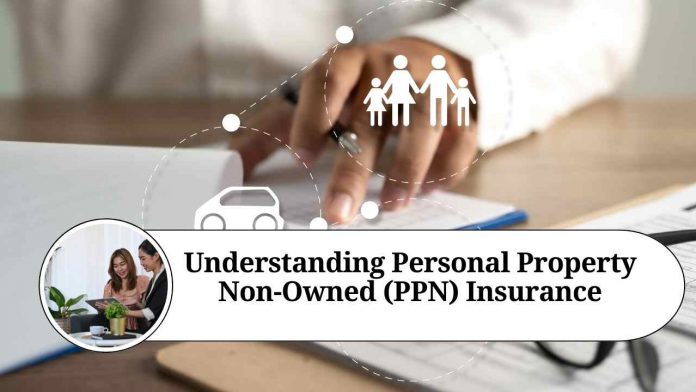When it comes to insurance, there are numerous terms and concepts to grasp. One such concept is Personal Property Non-Owned (PPN) insurance. It is a specialized coverage that offers protection for personal property that belongs to individuals but is temporarily located or used on someone else’s premises. In this blog, we will delve deeper into the world of PPN insurance, exploring its definition, importance, and how it functions to safeguard personal belongings.
What is Personal Property Non-Owned (PPN) Insurance?
Personal Property Non-Owned (PPN) insurance is a type of coverage designed to protect personal belongings that are not owned by the premises where they are temporarily located. This insurance typically applies to personal property such as furniture, appliances, electronics, and other possessions found in rental homes, furnished apartments, or temporary living arrangements. It provides coverage against loss or damage resulting from perils like fire, theft, vandalism, and natural disasters.
The Importance of PPN Insurance: PPN insurance is crucial for individuals who live in rental properties or furnished accommodations. While the property itself may be insured by the landlord, their insurance typically does not extend to cover the tenants’ personal belongings. In the unfortunate event of a fire, burglary, or any other covered peril, tenants would be left responsible for replacing their damaged or stolen items out of pocket. PPN insurance offers peace of mind by providing financial protection in such circumstances.
How Does PPN Insurance Work?
To obtain PPN insurance, individuals can purchase a separate policy or add it as an endorsement to their existing renters or homeowners insurance. The coverage limit and premiums will depend on various factors such as the value of the personal property being insured, the location of the premises, and the chosen deductible.
Once the policy is in place, the insured individual will be protected against covered perils outlined in the policy. If a covered loss occurs, such as a fire damaging their personal property in a rented apartment, the policyholder can file a claim with their insurance provider. The insurance company will assess the claim and, if approved, provide the necessary compensation to repair or replace the damaged items, up to the policy’s coverage limit.
It is essential to review the policy carefully to understand the coverage terms, exclusions, and any specific requirements or limitations. Certain high-value items like jewelry or art may require additional coverage or separate endorsements to ensure full protection.
Conclusion
Personal Property Non-Owned (PPN) insurance plays a vital role in protecting individuals’ personal belongings when temporarily located on someone else’s premises. Whether you are renting an apartment, staying in furnished accommodation, or temporarily relocating, having PPN insurance can provide the necessary coverage to safeguard your possessions. Remember to carefully assess your insurance needs, review policy details, and consult with an insurance professional to ensure you have adequate protection for your personal property. With PPN insurance in place, you can have peace of mind, knowing that your belongings are covered in case of unforeseen events.
Read more useful content:
Frequently Ask Questions
Q: What does PPN stand for in insurance?
A: PPN stands for Personal Property Non-Owned.
Q: What is Personal Property Non-Owned (PPN) insurance?
A: Personal Property Non-Owned (PPN) insurance is a specialized coverage that protects personal property that belongs to individuals but is temporarily located or used on someone else’s premises, such as rental homes or furnished accommodations.
Q: Why is PPN insurance important?
A: PPN insurance is important because it provides coverage for personal belongings that are not covered by the property owner’s insurance. It ensures that individuals are financially protected in the event of loss or damage to their personal property while it is located on someone else’s premises.
Q: What does PPN insurance cover?
A: PPN insurance typically covers personal property against perils such as fire, theft, vandalism, and natural disasters. The coverage extends to items like furniture, appliances, electronics, and other possessions temporarily located on someone else’s premises.
Q: Do I need PPN insurance if I rent a furnished apartment?
A: Yes, if you rent a furnished apartment, it is recommended to have PPN insurance. While the landlord’s insurance may cover the building and their property, it usually does not protect the tenant’s personal belongings. PPN insurance ensures that your personal property is protected in case of unforeseen events.
Q: Can I add PPN insurance to my existing renters or homeowners insurance?
A: Yes, you can typically add PPN insurance as an endorsement to your existing renters or homeowners insurance policy. This allows you to have comprehensive coverage for both the premises and your personal property.
Q: How does PPN insurance work in the event of a covered loss?
A: If a covered loss occurs, such as a fire or theft, the policyholder can file a claim with their insurance provider. The insurance company will assess the claim and, if approved, provide compensation to repair or replace the damaged or stolen items, up to the policy’s coverage limit.
Q: What factors can affect the cost of PPN insurance?
A: The cost of PPN insurance can be influenced by various factors, including the value of the personal property being insured, the location of the premises, the chosen deductible, and the coverage limit desired.
Q: Are there any specific requirements or limitations with PPN insurance?
A: Specific requirements or limitations may vary depending on the insurance provider and policy. It is important to review the policy carefully to understand the coverage terms, exclusions, and any specific requirements or limitations. Certain high-value items may require additional coverage or separate endorsements for full protection.
Q: How can I obtain PPN insurance?
A: To obtain PPN insurance, you can contact insurance providers and inquire about their policies. You can either purchase a separate PPN insurance policy or add it as an endorsement to your existing renters or homeowners insurance policy. Consulting with an insurance professional can help you determine the best coverage options for your needs.




















